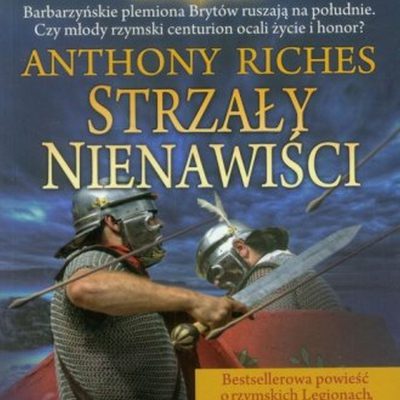The book “Arrows of Fury” is the second part of the historical novel series “Empire”, in which the author Anthony Riches takes us to the year 181 CE. The young centurion Marcus Valerius Aquilla, a fugitive from Rome, has to fight for the good name of his family, which during the reign of the new emperor Commodus was considered hostile to the Roman raison d’état. The Roman will also have to fight the hostile tribes of the Britons, who are mobilizing forces to attack Hadrian’s Wall.
The Battle of the Lost Eagle saved Hadrian’s Wall, but the new Roman governor of Britain must crush another rebellion of the northern tribes, led by the charismatic Calgus, who want to reclaim their homeland and drive the Romans out of the province. Marcus, the newly appointed centurion of the first tungrian cohort, hides his origins under a new name (Corvus) and tries to fight for justice. He has to face not only hordes of barbarian troops, but also many enemies who lurk in his own camp. He is surrounded by many officers who do not see the need to protect his person. Secrets may be revealed at every turn, and Corvus must fight for the life and glory of the Empire.
The book is very interesting and colorful. While reading, the time does not drag on, which is due to the brilliant description of the battles and camp life. The author proves that he perfectly understands what the life of ordinary privates and officers could look like – which draws the reader into the plot. The main character, Marcus, is shown as a warrior and a man who has people under his command who are ready to follow him to death. His character was portrayed very well. The drama of his fate and the situation in which he was placed only encourages us to follow the plot further. Apart from his story, there are other parallel threads, such as Rufius and Dubnus. However, despite the multitude of people, Aquilla is the central character of the novel.
In the book, Marcus is given a cohort of untrained (Roman-style) and untempered Syrian archers who undergo typical Roman training and are ridiculed by other troops. Only when the Syrians (Qadir’s expressive character as optio) begin to use their natural weapons – cunning and bows, do they gain respect. The plot has many minor threads that only color the life of Roman legionnaires and allow you to better understand how hard life ancient soldiers once led.
At the end of the book, the author has included a short dissertation on the Roman army during this period, which allows you to better understand those times and the Roman hierarchy in the army. The author based all his descriptions and considerations on many years of research.
The book is recommended for every enthusiast of military and Roman history. The plot is colorful, and the uncertain fate of Aquilla only forces us to follow the story further. What surprised me personally was the fact that the author wrote a typically “male” position. There is no place for romance and affection here. It presents a raw, life and masculine approach to war, combat and honor. However, I think it is effective.


